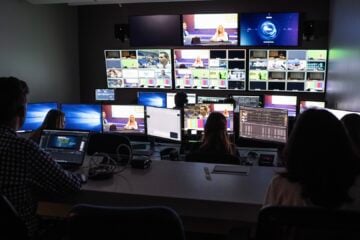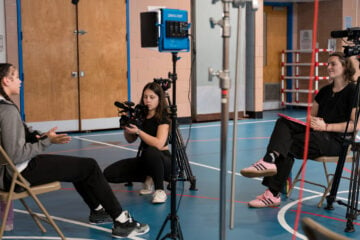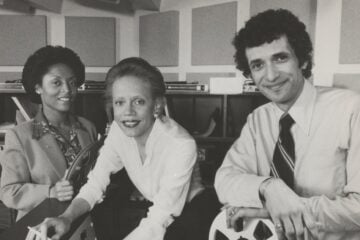NPR restructures its Story Lab incubator
NPR is increasing organizational support for its Story Lab initiative, created last year to develop new podcast, program, and segment ideas.
Michael May began running Story Lab last June as an experiment, but now some of the processes he established will become more formalized and invite participation from across the organization.
In Story Lab’s expansion, May will shift focus to News Lab, a process for developing ideas within existing programs, and two NPR executives will lead the overarching Story Lab initiative: Anya Grundmann, v.p. of programming and audience development, and Chris Turpin, v.p. of news programming and operations. Within the programming department, Steve Nelson and N’Jeri Eaton will lead a review process for vetting ideas both internally and externally. Eric Athas, who leads NPR Training, will run Story Lab workshops to develop podcast and program ideas from outside the organization. Tamar Charney, managing editor for NPR One, will coordinate testing of new show ideas on the app.
“We’re trying to . . . look at our content creation across all of our divisions instead of creating silos,” Grundmann told Current. “We’re trying to bring our enterprise work all together so that we’re able to look at them together and make sure the right content is going to the right places with the right voices at the right times.”
One of the goals of the revamped Story Lab is “profoundly engaging with folks outside of NPR,” Grundmann said.
Earlier this year, NPR hosted a three-day audio storytelling workshop during which 12 teams of member-station staffers and independent producers met in Washington, D.C., to develop podcast or radio program ideas. NPR intends to continue engaging with producers outside NPR by investing $10,000 and offering continued support for three of those ideas.

Creators of the podcast The Stoop: Julie Caine, Hana Baba, Leila Day (left to right).
That commitment, announced today, will be for a podcast developed in partnership with KERA in Dallas: Drugged will be hosted by KERA’s Lauren Silverman and a Dallas Morning News reporter and focus on how drugs “change our bodies and our world,” NPR said in its announcement. Another podcast, The Stoop, will tell stories of black identity. A team from KALW in San Francisco, co-hosts Leila Day and Hana Baba and editor Julie Caine, are developing this idea. NPR is also backing Do Over, a podcast exploring what a person’s life would have been like if they made a different life decision, such as who to marry. It is being developed independently by co-hosts Kelly Jones and Chioke I’Anson and producer Claire Tacon.
NPR wasn’t initially planning on funding the best ideas from the storytelling workshop, but the projects “showed so much promise that we really want to invest and help them develop their pilots and set them up for success,” said Athas, who ran the workshop.
NPR plans to mount another storytelling workshop next March and invest $10,000 in up to three projects, according to Athas. It will accept submissions of program and podcast ideas that applicants want to workshop until November 16. The network received more than 100 applications for its first workshop.
To make it easier for outside producers to submit pitches and ideas, NPR is creating a new portal that will accept show pitches on a rolling basis, in addition to the storytelling workshop applications.
“I think that the Story Lab is really about bringing all the resources of NPR together to focus on innovation and making great new stuff,” Nelson said. “…A lot is changing in the world of public media, from podcasts to shows changing, to the way people are using media. We want to make sure we’re making content that appeals to all kinds of people as they’re looking a way to fill their ear time.”
Growing ideas within NPR
Story Lab saw some successes in its first year — including a pilot of a kids’ podcast developed by NPR designers and a podcast NPR correspondent Gregory Warner is working on that generated a segment on Invisibilia — but the process of giving staffers two weeks to develop passion projects had its challenges, according to May.
“…[W]hat happens after the two weeks? Someone pitches, ‘I want to do a five-part series …,’ and we get one-and-a-half stories done, then what? They limp along. We’ve actually succeeded at doing stuff, but mostly it ends up on my plate to just figure out how to keep them moving forward,” May said.
The process of developing ideas over two weeks has evolved. Instead of being open-ended in considering all proposals, Story Lab will call out for ideas, such as a project with humor as the frame.
In his time at NPR, May has noticed a divide between the newsroom, which is focused on daily reporting, and programming, which has been “able to use all the new storytelling techniques that we’re seeing in podcasts,” he said.
“The newsroom was sort of being left out of the party,” he added. “It was like, ‘Okay how can we bridge that? How can we give people in the newsroom the chance to play in this new audio storytelling world? Because there are people in the newsroom who are very creative and very eager to try all of that stuff. The new Story Lab formalizes that in a much stronger way.”
Under May’s leadership of News Lab, NPR looks to develop new ways of telling stories within the newsroom. The process invites producers and reporters within a program to pitch segment ideas; May works with managers of the program to choose one idea to pursue. Then the staffer who pitched the idea gets three weeks to develop it further. May has already collaborated with producers of Weekend Edition and All Things Considered on this process.
A new series called Been There developed out of ATC’s News Lab and aired its first story Oct. 11. Through this series, ATC connects someone who is going through a major life change with person who previously experienced a something similar.
“It’s easier to be a force multiplier if you’re working with someone’s boss from the get go,” May said.





